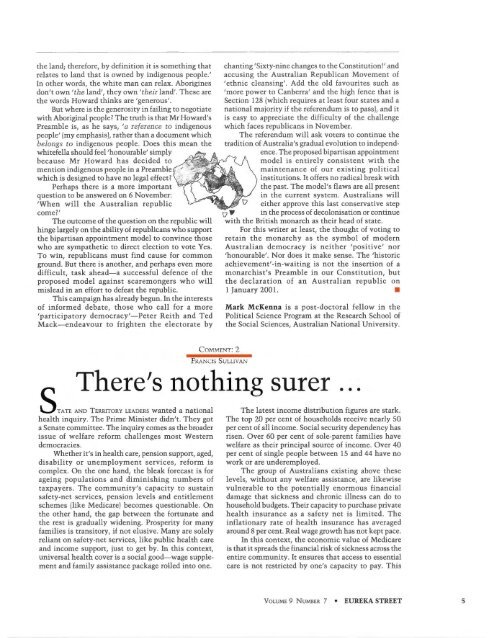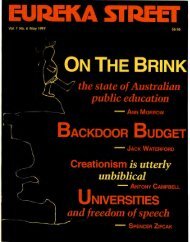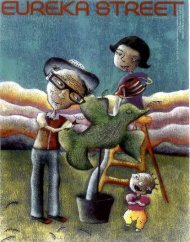1 - Eureka Street
1 - Eureka Street
1 - Eureka Street
- No tags were found...
Create successful ePaper yourself
Turn your PDF publications into a flip-book with our unique Google optimized e-Paper software.
the landi therefore, by definition it is something thatrelates to land that is owned by indigenous people.'In other words, the white man can relax. Aboriginesdon't own 'the land', they own 'their land'. These arethe words Howard thinks are 'generous'.But where is the generosity in failing to negotiatewith Aboriginal people? The truth is that Mr Howard'sPreamble is, as he says, 'a reference to indigenouspeople' (my emphasis), rather than a document whichbelongs to indigenous people. Does this mean thewhitefella should feel'honourable' simplybecause Mr Howard h as decided tomention indigenous people in a Preamble '. ' ·which is designed to have no legal effect ? .·;,:·_::Perhaps there is a more important 'question to be answered on 6 November:'When will the Australian republiccome?'The outcome of the question on the republic willhinge largely on the ability of republicans who supportthe bipartisan appointment model to convince thosewho are sympathetic to direct election to vote Yes.To win, republicans must find cause for commonground. But there is another, and perhaps even moredifficult, task ahead-a successful defence of theproposed model against scaremongers who willmislead in an effort to defeat the republic.This campaign has already begun. In the interestsof informed debate, those who call for a more'participatory democracy'-Pet er Reith and TedMack-endeavour to frighten the electorate bychanting 'Sixty-nine changes to the Constitution I' andaccusing the Australian Republican Movement of'ethnic cleansing'. Add the old favourites such as'more power to Canberra' and the high fence that isSection 128 (which requires at least four states and anational majority if the referendum is to pass), and itis easy to appreciate the difficulty of the challengewhich faces republicans in November.The referendum will ask voters to continue thetradition of Australia's gradual evolution to independence.The proposed bipartisan appointmentmodel is entirely consistent with themaintenance of our existing politicalinstitutions. It offers no radical break withthe past. The m odel's flaws are all presentin the current system. Australians willeither approve this last conservative step\:7 \J in the process of decolonisation or continuewith the British monarch as their h ead of state.For this writer at least, the thought of voting toretain the monarchy as the symbol of modernAustralian democracy is n either ' positive' nor'honourable'. Nor does it make sense. The 'historicachievem ent'-in-waiting is n ot the insertion of amonarchist's Preamble in our Constitution, butthe declaration of an Australian republic on1 January 2001. •Mark McKenna is a post -doctoral fellow in thePolitical Science Program at the Research School ofthe Social Sciences, Australian National University.C oMMENT: 2F RANCJS SULLIVANThere's nothing surer• • •S TATe AND Tc.moRY mom w•nted 'notion•!health inquiry. The Prime Minister didn't. They gota Senate committee. The inquiry comes as the broaderissue of welfare reform challenges m ost Westerndemocracies.Whether it's in health care, pension support, aged,disability or unemployment services, reform iscomplex. On the one hand, the bleak forecast is forageing populations and diminishing numbers oftaxpayers. The community's capacity to sustainsafety-net services, pension levels and e n~itl ementschem es (like M edicare) becomes questionable. Onthe other hand, the gap between the fortunate andthe rest is gradually widening. Prosperity for manyfamilies is transitory, if not elusive. Many are solelyreliant on safety-n et services, like public health careand income support, just to get by. In this context,universal health cover is a social good-wage supplement and family assistance package rolled into one.The latest income distribution figures are stark.The top 20 per cent of households receive nearly SOper cent of all incom e. Social security dependency hasrisen. Over 60 per cent of sole-parent families havewelfare as their principal source of income. Over 40per cent of single people between 15 and 44 have nowork or are underemployed.The group of Australians existing above theselevels, without any welfare assistance, are likewisevulnerable to the potentially enorm ous financialdamage that sickness and chronic illness can do tohousehold budgets. Their capacity to purchase privateh ealth insurance as a safety n et is limited. Theinflationary rate of h ealth insurance h as averagedaround 8 per cent. Real wage growth has not kept pace.In this context, the economic value of Medicareis that it spreads the financial risk of sickness across theentire community. It ensures that access to essentialcare is not restricted by one's capacity to pay. ThisVOLUME 9 N UMBER 7 • EUREKA STREET 5
















